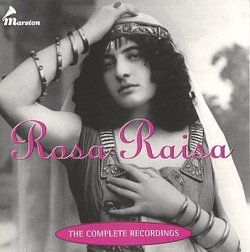| All Artists: Rosa Raisa Title: Complete Recordings Members Wishing: 1 Total Copies: 0 Label: Marston Release Date: 8/11/1998 Album Type: Import Genres: Special Interest, Pop, Classical Styles: Vocal Pop, Opera & Classical Vocal, Historical Periods, Classical (c.1770-1830), Modern, 20th, & 21st Century Number of Discs: 3 SwapaCD Credits: 3 UPC: 638335300122 |
Search - Rosa Raisa :: Complete Recordings
 | Rosa Raisa Complete Recordings Genres: Special Interest, Pop, Classical
|
Larger Image |
CD Details |
CD ReviewsFascinating compilation of a forgotten soprano Ivy Lin | NY NY | 06/10/2002 (5 out of 5 stars) "In the 1920s, there were two "Rosas" in the world of opera: Rosa Ponselle and Rosa Raisa. They sang many of the same roles, and were generally considered among the best dramatic sopranos of their time. Since then, not a year goes by without some Opera News tribute to Rosa Ponselle, while Rosa Raisa up until now has been largely forgotten. Now, thanks to Ward Marston's 3 CD set and Charles Mintzer's biography, we are 'rediscovering' the woman who created Puccini's Turandot.
Raisa refused to listen to her own recordings, saying they did not do her justice. And they probably did not. From all accounts hers was a gigantic, somewhat undisciplined voice (although flexible enough to sing Norma and other bel canto roles) and, like Leontyne Price's voice, it was an 'inverted triangle' -- strong on top and weaker on bottom. We can hear this in her records -- huge high C's that are not recorded very well, but the bottom is often unattractively hollow, with many glottal gulps, with some old-fashioned chest voice often thrown in. Raisa never attached herself to a major recording company until late in life, and her first recordings for Pathe are a real trial to listen to. One wonders if she had a Victor contract whether her voice would have sounded better. Surprisingly for a woman known more for vocal opulence than acting ability, the sound of the voice itself is often rather bland -- slightly nasal and not all that memorable. Raisa was born Jewish and people have commented that it was a 'semitic' voice -- it does seem to lack the warmth and vibrancy of, say, Claudia Muzio's instrument. So why listen to her at all? For one, there are several tracks which are truly spectacular and show what the fuss was all about. Her rendition of the Bolero from "I Vespri" is one of those moments. Raisa was also well-schooled in the bel canto tradition -- she had an excellent trill and in 'Ah bello a mi ritorna" (she records both verses) the runs in the very embellished second verse are both flamboyant and very accurate. Unlike Rosa Ponselle, whose recordings are all very similar -- absolutely vocally magnificent -- Raisa is one of those singers where one must 'dig' for treasures. She ranges from astonishing to mediocre to frankly awful. She was known as a somewhat variable performer, and this quality might have translated to the studio too. Listen to an awkward "O patria mia" where she is both flat and wiry on her high C, and you might wonder what the fuss is all about. Listen to a beautifully sung, expressive "La altra notte" and there is no doubt that when Raisa was on, she was truly one of the greatest singers of her time. The third cd is 'filled out' with an extended interview with the aged diva, where she sounds down-to-earth and fun, with none of the bitterness and hauteur one would associate with an aged "Norma Desmond."" |

 Track Listings (21) - Disc #1
Track Listings (21) - Disc #1